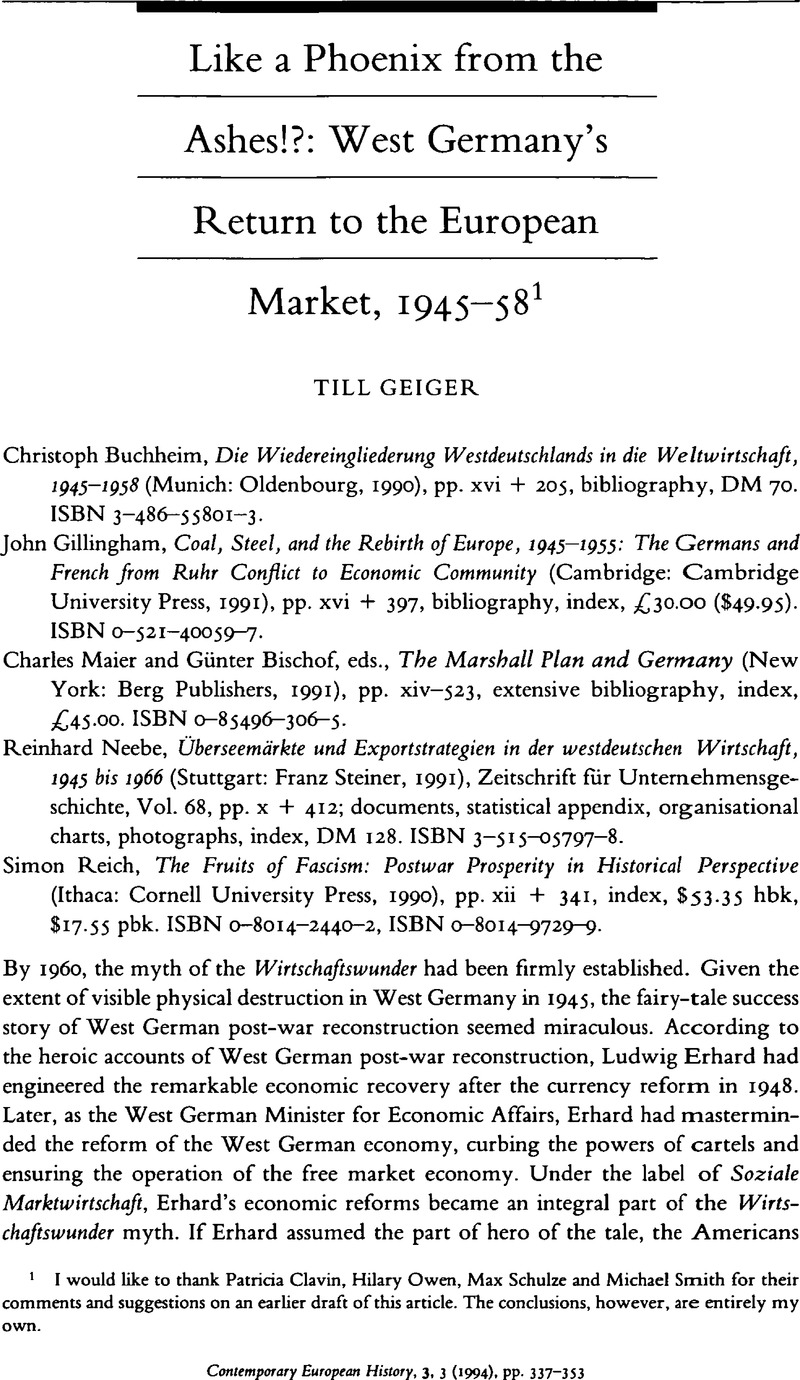No CrossRef data available.
Article contents
Like a Phoenix From the Ashes!?: West Germany's Return to the European Market, 1945–581
Published online by Cambridge University Press: 12 September 2008
Abstract

- Type
- Review Articles
- Information
- Copyright
- Copyright © Cambridge University Press 1994
References
2 Maizels, Alfred, Industrial Growth and World Trade: World Trends in Production, Consumption and Trade in Manufactures (Cambridge: Cambridge University Press, 1963), 190Google Scholar, Table 8.1.,
3 Lynch, Frances, ‘Resolving the Paradox of the Marshall Plan: National and International Planning in French Reconstruction’, Economic History Review, Vol. 37, no. 2 (1984), 229–43.CrossRefGoogle Scholar
4 Gillingham's, analysis draws rather heavily on Cornelli Barnett's controversial critique of the British war economy: The Audit of War: The Illusion and Reality of Britain as a Great Power (Basingstoke: Macmillan, 1986).Google Scholar Even if the record of the British war economy does not quite match the glorified picture of the official histories, the achievements still remain impressive and hardly amount to the unmitigated disaster Barnett claims. The difficulties of the British coal industry pre-dated the war. Clearly the war exacerbated the structural problems of the industry. By the end of the war, a growing majority favoured nationalisation of the coal industry to modernise British mines.
5 See also the more detailed account by Roseman, Mark, ‘The Uncontrolled Economy: Ruhr Coal Production, 1945–8’, in Turner, Ian, ed., Reconstruction in Post-war Germany: British Occupation Policy and the Western Zones, 1945–1955 (thereafter Turner, Reconstruction) (Oxford: Berg, 1989), 93–123.Google Scholar
6 Abelshauser, Werner, Der Ruhrkohlenbergbau seit 1945 (Munich: C. H. Beck, 1984), 15–49Google Scholar; Farquharson, John, The Western Allies and the Politics of Food: Agrarian Management in Postwar Germany (Leamington Spa: Berg, 1985), 45–9.Google Scholar
7 Roseman, Mark, Recasting the Ruhr, 1945–1958: Manpower, Economic Recovery and Labour Relations (New York: Berg, 1992), 59–64.Google Scholar
8 Geiger, Till, ‘British Policy on the Allocation, the Distribution and the Prices of Ruhr Coal Exports, 1945–1947’, unpublished MSc report (London School of Economics, 1987).Google Scholar
9 Deighton, Anne, The Impossible Peace: Britain, the Division of Germany, and the Origins of the Cold War (Oxford: Clarendon Press, 1990), 105–15.Google Scholar
10 Milward, Alan, The Reconstruction of Western Europe, 1945–51 (thereafter, Milward, Reconstruction) (London: Methuen, 1984), 19–55.Google Scholar
11 United Nations Economic Commission for Europe, A Survey of the Economic Situation and the Prospects of Europe (Geneva: United Nations, 1948), 3–10.Google Scholar
12 Abelshauser, Werner, Wirtschaftsgeschichte der Bundesrepublik, 1945–1980 (Frankfurt: Suhrkamp, 1983).Google ScholarIdem, ‘Wiederaufbau vor dem Marshallplan: Wachstumschancen und die Wirtschaftsordnungs-politik in der zweiten Hälfte der vierziger Jahre’, Vierteljahreshefte für Zeitgeschichte, Vol. 29, no. 4 (1981), 545–78.Google Scholar
13 Carlin, Wendy, ‘Economic Reconstruction in Western Germany, 1945–55: The Displacement of “Vegetative Control”’, in Turner, Reconstruction, 37–65.Google Scholar
14 Niederschrift der 7. Sitzung des Ausschuss für Kapitalverkehr am 5. Juni 1950 in Bonn, BA B 102/28587, Bundesarchiv, Koblenz.
15 Kindelberger, Charles, ‘Did Dollars Save the World?’, in Kindelberger, Charles, ed., Marshall Plan Days (Boston: Allen & Unwin), 257–60.Google Scholar
16 Milward, , Reconstruction, 212–31.Google Scholar
17 Ellis, Howard, The Economics of Freedom: The Progress and Future of Aid to Europe (New York: Harper and Brothers, 1950), 325–50Google Scholar; Zamagni, Vera, ‘Betting on the Future: The Reconstruction of Italian Industry, 1946–52’, in Becker, Josef and Knipping, Franz, eds., Power in Europe? Great Britain, France, Italy and Germany in a Postwar World, 1945–1950 (Berlin: Walter de Gruyter, 1986), 289–97.Google Scholar
18 Cf. also the account of the West German balance of payments crisis by Kaplan, Jacob and Schleiminger, Günther, The European Payments Union: Financial Diplomacy in the 1950s (Oxford: Clarendon Press, 1989), 97–118Google Scholar; Bank of International Settlements, Twenty-first Annual Report: 1st April 1950–31st March 1951 (Basle: Bank for International Settlements, 1951), 45–53.Google Scholar
19 Extract from the Minutes of the Economic Steering Committee held in the Cabinet Office on Thursday, 23 Nov. 1950, at 4.30 p.m., E.S.(50)6th Meeting [CAB 134/263], in Documents of British Policy Overseas, Series II, vol. 3 (1950), no. 112, 282–5.
20 This question is inspired by the claims of British economic historians that Korean War rearmament stifled British economic development; cf. for example, Pollard, Sidney, The Wasting of the British Economy, 2nd ed. (London: Edward Arnold, 1984), 36–8.Google Scholar
21 Abelshauser, Werner, ‘Rüstung, Wirtschaft, Rüstungswirtschaft: Wirtschaftliche Aspekte des Kalten Krieges in den fünfziger Jahren’, in Maier, Klaus A. and Wiggershaus, Norbert, eds., Das Nordatlantische Bündnis, 1949–1956 (thereafter, Abelshauser, ‘Rüstungswirtschaft’) (Munich: Olden-bourg, 1993), 96–100.Google ScholarKlenke, Dietmar, Bundesdeutsche Verkehrspolitik und Motorisierung: Konfliktträchtige Weichenstellungen in den Jahren des Wiederaufstiegs (thereafter Klenke, Verkehrspolitik) (Stuttgart: Franz Steiner, 1993), 294–7.Google Scholar
22 Eichengreen, Barry, ‘A Payments Mechanism for the Former Soviet Union: Is the EPU a Relevant Precedent?’, Economic Policy, Vol. 8, no. 17 (1993), 309–53.CrossRefGoogle Scholar
23 Abelshauser, , ‘Rüstungswirtschaft’, 100–3; Alan Milward, The European Rescue of the Nation-State (thereafter Milward, European Rescue) (London: Routledge, 1992), 396–424.Google Scholar
24 Burleigh, Michael and Wippermann, Wolfgang, The Racial State: Germany, 1933–1945 (Cambridge: Cambridge University Press, 1991), 12–3.Google Scholar Cf. also Reich, 303–4.
25 Olson, Mancur, The Rise and Decline of Nations: Economic Growth, Stagflation, and Social Rigidities (New Haven: Yale University Press, 1982), 75–80.Google Scholar
26 Milward, , European Rescue, 408–20.Google Scholar
27 Klenke, Verkehrspolitik, passim; but also Berghahn, Volker, Unternehmer und Politik in der Bundesrepublik (Frankfurt am Main: Suhrkamp, 1985) 180–201.Google Scholar




